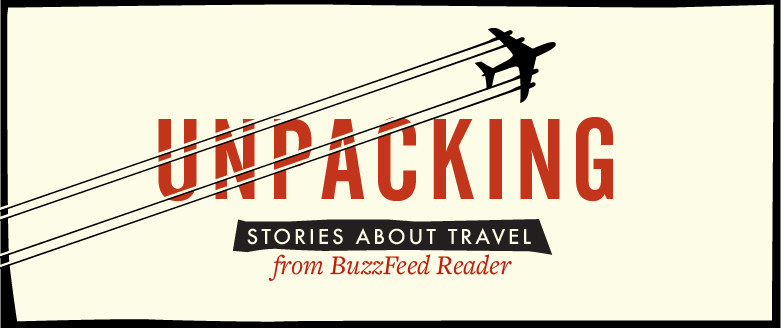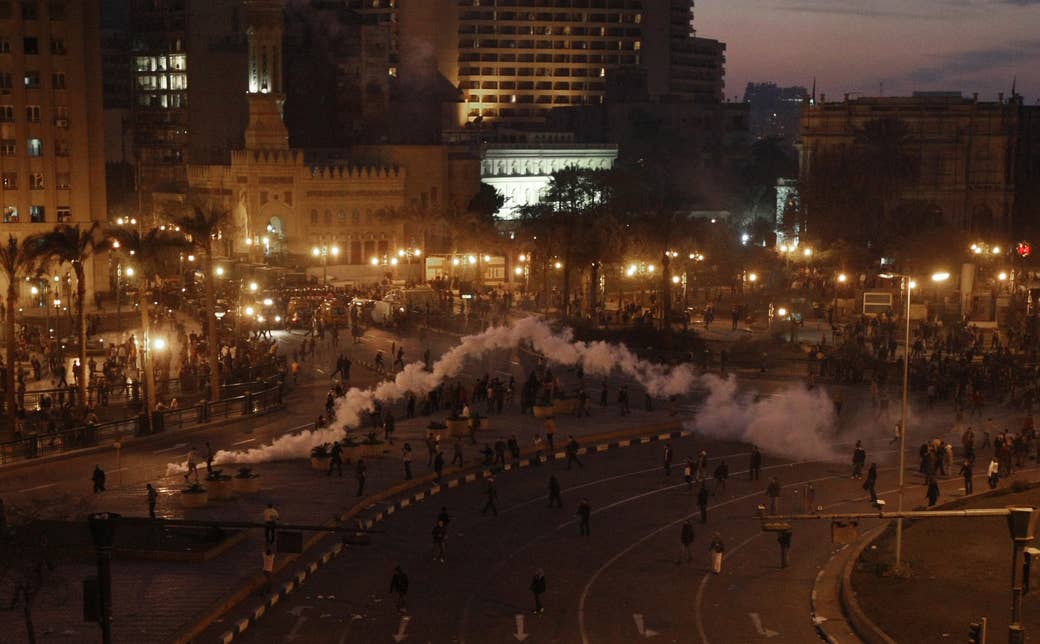
My lungs burned as I stared at an opaque, billowing cloud of tear gas, just yards in front of me. I was on a bridge over the Nile in Cairo, just a few blocks from the apartment I was renting that semester while I took Arabic classes as part of a post–high school gap year. It was January 2011 and the Egyptian revolution, which would eventually topple the decades-long political regime of President Hosni Mubarak, had just begun.
I looked ahead to the row of police officers standing between me and the tear gas, which obscured the off-ramp of the bridge — and then back toward the other end of the bridge, where a crowd of protesters had gathered, chanting in Arabic and trying to rub the gas out of their streaming eyes. I could imagine what would happen if the crowd reached me. I could imagine the clash between the protesters, could imagine the nightsticks the riot police would use, hard against my ribcage, the sound bombs and fire trucks that would jet water directly into the crowd — into me. I could imagine this because I had seen it — earlier the very same day, back on the other side of the bridge. I needed to get back to my apartment, fast.
I approached the line of uniformed police officers, their feet planted firmly on pavement. As I made to pass between them, one stepped in front of me, blocking my way. Another ran up, speaking loudly and rapidly in Arabic I couldn’t catch. “No,” he said to me in English. I heard other police officers repeat the same in Arabic to the Egyptian men and women around me, trying to get home, just like me.
I knew enough Arabic to argue with the officers. “I live there,” I pleaded in Arabic, pointing through the cloud. I told them my address. “I want to go,” I insisted.
“No,” they said. No, no, no. They told me to turn around. They pointed. They body-blocked me. But as my words grew louder, I noticed that they began to hesitate, glancing at one another and shifting their weight from booted foot to booted foot. What followed would forever change how I saw myself.
As they continued to yell at Egyptians behind me to step back, they let me pass between them and sprint through the cloud of gas. I was the only one they let go.
Later, after I made it back to my apartment, my throat still searing, I questioned why they had let me through. I realized they did not want me to get hurt — not because they particularly cared about my wellbeing, but because they did not want my face caught on camera, projected on international news. I was white and obviously American — English-speaking, clothed in American brands — and that was why I could escape.
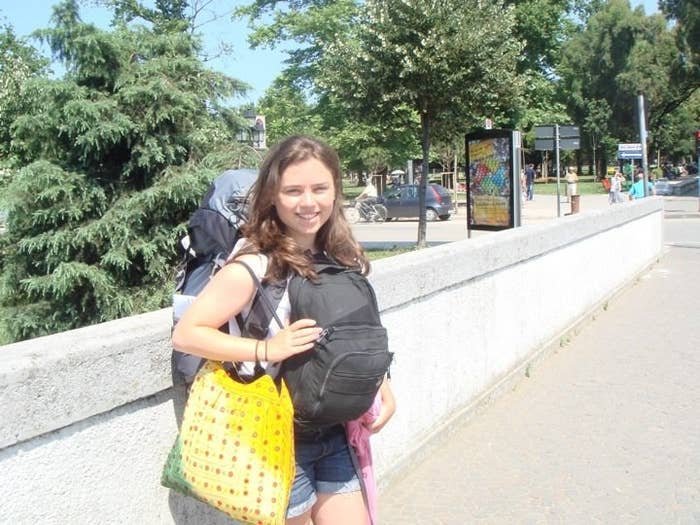
My American citizenship and white skin grant me enormous privilege. At home in Boston, I have opportunities and rights that many people all over the world — including many Americans — cannot access. Those benefits range from my experience during job interviews to my assumed belonging in exclusive spaces to my access to education and health care. And everywhere I travel, I experience the privilege of whiteness and American citizenship, from how I am treated at passport control to the buying power of the dollar abroad to my ability to enter 176 countries without securing a visa in advance. I have one of the most powerful passports in the world; citizens of Egypt, for comparison, can travel to fewer than a third as many countries without a visa. The facts make my privilege plain.
But before that day on the bridge in Cairo, I had never before seen it thrown into such harsh contrast with those around me. That day, my citizenship and race brought me to a safety that the Egyptians standing next to me could not so easily access. They may even have saved my life. And ever since — every time I travel, or think back on the trips I’ve taken — I’ve been registering more subtle manifestations of that privilege, which I didn’t fully understand until I came face to face with it in Egypt.
When I was in second grade, my parents took me and my two brothers on a year-long trip around the world. We were homeschooled, and spent our days in “classrooms” that ranged from a Costa Rican cloud forest sanctuary to the ruins at Angkor Wat. My parents wanted me to become aware of the difference between the American media’s portrayal of the world and what the world was actually like. They wanted me to build up healthy skepticism, to ask questions before assuming answers. They did not, however, teach me to question travel itself. I never thought to interrogate the premise of all our trips: the idea that there was some essential truth that could only be discovered by visiting a place myself.
My parents taught me a narrative of travel that is centuries old and rooted in European colonialism. As I see it now, they seem to believe that the world is something to be explored; that their presence as Westerners is a positive force on the places they visit; that they will be not only welcomed, but accommodated everywhere they go, because where they come from is far more “advanced” than anywhere they might visit. My parents were never rude to people we met, never made fun of them; the problem was much subtler than that. It was in the tone of voice my dad used to talk to tuk tuk drivers in Chiang Mai, or in how my mom asked for boiled potatoes at a Japanese inn, though they weren’t even close to on the menu. I grew up watching my dad take pictures of people, wherever we went. Once, when I was a teenager, I challenged him.
“Would you go up to somebody in Boston and take a picture of them without asking permission?”
“No, but that’s different,” he said.
It’s the same, I thought, but I let it go. What I would say now is that my parents’ choices, which seemed small, implied a separateness between us and the people and cultures we encountered. Though I don’t believe it was conscious, they were entitled.
That sense of superiority was reinforced over and over again. When I traveled as a little kid, people everywhere commented about how cute I was. They pinched my cheeks, petted my hair, and smiled. That happened not just in Guatemala or Thailand but in Boston, too; I was a cute kid. Sometimes, though, people outside of the US made comments specific to my light skin or light brown hair color. One day, walking around Tiananmen Square, my parents were stopped every few yards so that people we didn’t know could take pictures of us foreign kids with their families. At the time, I was mainly just annoyed that the mini photo shoots meant a delay between me and the pork dumplings I knew we would have for dinner. As an adult, I can imagine that those photos went into albums and slideshows that were shown to friends and family, that our appearance was something to show off, something that lent status: association with — thought not access to — our race and citizenship privileges.
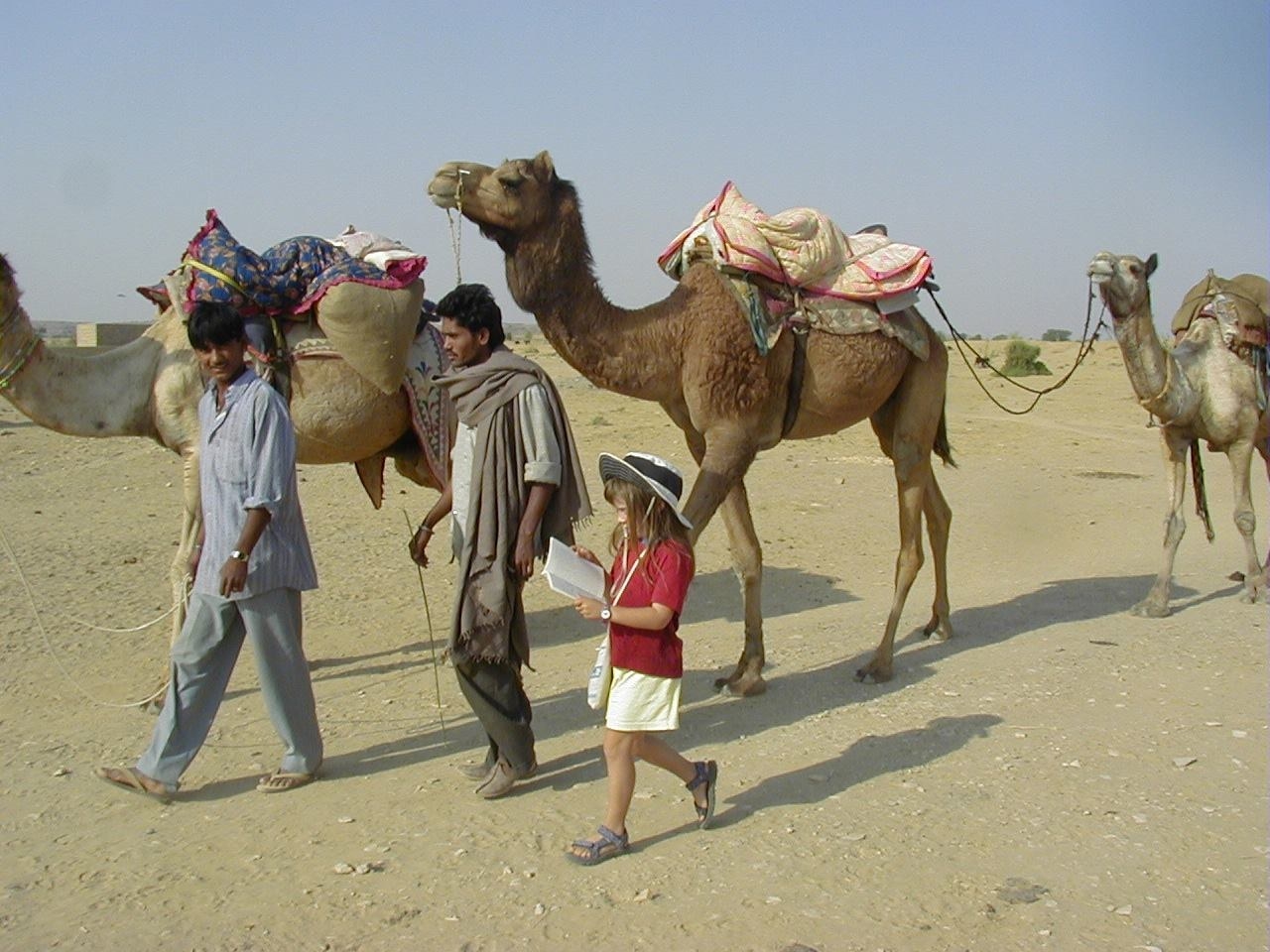
On my gap year trip, I was an adult, and though I looked young for my 18 years, I was alone everywhere I went — clearly no longer a “cute kid.” But I was still treated differently because of my appearance. One evening a couple of weeks before the Egyptian revolution began, I found myself approaching a fancy bar on the bank of the Nile with a white Austrian friend, dressed in stretchy pants and a fading Gap T-shirt. Looking at the long line of women in stylish dresses, waiting to go inside, I begged my friend to go home — there was no way we’d get in. But she had lived in Egypt longer than I had, and she assured me it would be fine.
Before we could even head to the back of the line, the bouncer unhooked a red velvet rope and beckoned for us to come inside. My clothes gave no indication that I had sophisticated taste, or good dance moves, or money to blow, but it didn’t matter. A white American like me would attract more patrons. I was good for business.
While at home, I’m vaguely aware of my wealth and my relatively stable job, compared to the rest of the world and many Americans. But in many other countries, my job’s daily rate surpasses the average monthly salary. My ability to rent an Airbnb for a wildly inflated price is driving up the cost of rent in places where people can’t afford to spend an extra nickel. I get treated better at restaurants and hotels, and by salespeople in America, because I am white and have no “foreign” accent — and the difference in treatment is even more marked outside of the US, where it often seems assumed that my white skin and American accent come with an exceptionally thick wallet. Though I’ve traveled fairly easily through dozens of countries over my life, I’ve never had to learn a second or third language; English is commonly spoken almost everywhere. And when I commit a cultural — even legal — faux pas, I am easily forgiven.
Traveling as an adult in Shiraz, Iran, I wore a long tunic as part of the legally mandated hijab. One blustery afternoon, the desert wind was especially strong, and unbeknownst to me my tunic blew up around my waist. A woman rushed up to me, agitated, scolding me in Farsi. But when I said, in English, “I’m sorry, I don’t understand,” she smiled back, pointed at my clothes, and went on her way. I broke the law, and while she wasn’t forgiving of me when she assumed I was Iranian, she gave me a free pass for being foreign. Yes, this could be a genuine sense of hospitality and open-mindedness. But when it happens over and over again, and seems particular to my status as a white person or American, I question whether it is a hospitality extended to people in general, or simply people who look like me.
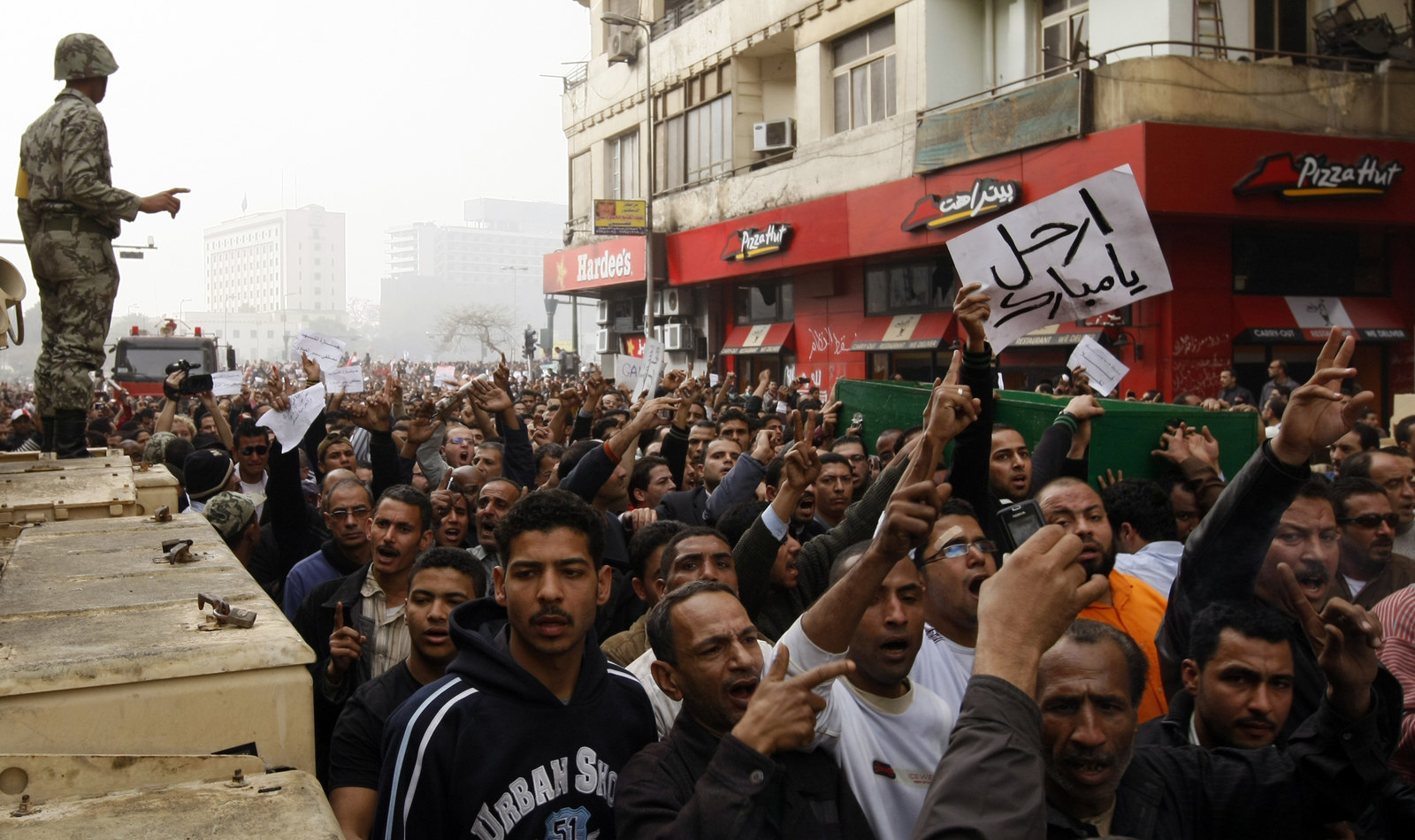
Over the days following my escape from the bridge in Cairo, I watched the city erupt. When my neighbors started patrolling the streets of my little neighborhood with machetes and knives at night, I knew I had to leave. My race or nationality may have meant leniency and access, but they were not a shield against actual, physical violence.
I contacted my parents. “Don’t worry,” they said. “We’ll get you out.” I believed them, because I knew that in a crisis like this, an American-sounding name, an American credit card, a stable American internet connection, and my US passport could get me out — just as my white skin had opened up an exit from that bridge.
I faced a sea of people in Cairo International Airport. Families clustered around stacks of suitcases and bags, up against one another, tight constellations of human flesh and panic and hope. These families had made it to the airport, past military tanks and lines of riot police, the air in their buses and taxis thick with tear gas and smoke. I had never seen an airport this crowded; it was like a stampede leaving a burning building, which, in a way, we all were. But these people were not checking in for flights. I realized that, unlike me, they did not have tickets, and there were no tickets left for them to buy. Airline desks were swarmed by Americans and other Westerners checking in for flights they had purchased like I had, using foreign contacts and European names and native-English-speaker accents.
I checked in for not one flight, but two — many airlines had stopped flying in and out of Cairo for security reasons, and my parents wanted to make extra sure I wouldn’t get stuck. I pushed through the crowd, stepping over infant legs and prayer mats as I made my way toward security. I did not learn those peoples’ names or try to understand their stories in that moment; my focus was on getting to a safer place, and that meant moving forward. Looking back, I wish I had seen them more clearly as individual people. Whose seat would I take on the flight I was about to board? Was it the elderly woman in the dust-streaked scarf, sitting on the floor, surrounded by giggling grandchildren? Was it the young man using his backpack as a stool? Was it the little girl in her mother’s lap, confused, crying?
One of my two flights was canceled, and the other seven hours delayed, but eventually I boarded the plane and looked around; my flight was filled almost entirely with Western people, many of whom were Americans.
We were all on our way home.
It took more than 10 years of traveling extensively before I thought much about the manifestations, big and small, of my privilege traveling as a white American. It took both the extreme circumstances I faced in Cairo and the everyday differences, things like getting into that bar for the wrong reasons, to change my perspective. Now, as an adult, I see that traveling is not just about exploring the world around me, but questioning my own assumptions and place in it. Traveling has the potential to illuminate not just the worlds we enter as tourists, but also our own internal worlds. And if we let it, travel can also tell us something of the worlds we leave behind, back home — and how we treat visitors there.
Many Americans assume that when in the US, tourists will read signs that are in English. Many of us get impatient with people who don’t speak English fluently, or who do so with an “un-American” accent. Many of us assume the worst of visitors from Arab countries — and anybody who looks like “them.” These things become habit. But maybe, by traveling and stepping outside of our own worlds — bubbles of people with similar identities, backgrounds, and statuses — we can build compassion not just for people far from home, but people closer to it. ●
Katie Simon is writing a memoir about the year she got the plague (yes, that plague), was raped by a stranger in an alleyway, and found herself in Cairo during the Egyptian revolution — all while traveling alone as a teenager. Her writing has appeared in the Washington Post, the Rumpus, Health, Bust, Women's Health, and elsewhere.
This essay is part of a series of stories about travel.
